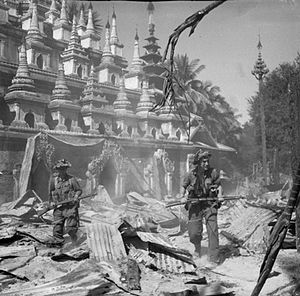Burma Campaign 1944–1945
| Burma Campaign 1944–1945 | |||||||||
|---|---|---|---|---|---|---|---|---|---|
| Part of the Burma Campaign during World War II | |||||||||
 Two British soldiers patrol the ruins of Bahe, in Central Burma |
|||||||||
|
|||||||||
| Belligerents | |||||||||
Medical Support: |
|||||||||
| Commanders and leaders | |||||||||
| Casualties and losses | |||||||||
|
|
||||||||
Medical Support:
The Burma Campaign in the South-East Asian Theatre of World War II was fought primarily by British Commonwealth, Chinese and United States forces against the forces of Imperial Japan, who were assisted to some degree by Thailand, the Burmese Independence Army and the Indian National Army. The British Commonwealth land forces were drawn primarily from the United Kingdom, British India and Africa.
Partly because monsoon rains made effective campaigning possible only for about half of the year, the Burma campaign was almost the longest campaign of the war. During the campaigning season of 1942, the Japanese had conquered Burma, driving British, Indian and Chinese forces from the country and forcing the British administration to flee into India. After scoring some defensive successes during 1943, they then attempted to forestall Allied offensives in 1944 by launching an invasion of India (Operation U-Go). This had failed with disastrous losses.
...
Wikipedia
